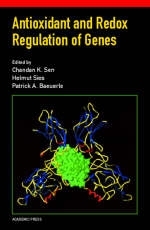
Antioxidant and Redox Regulation of Genes
Academic Press Inc (Verlag)
978-0-12-636670-9 (ISBN)
Dr. Chandan K Sen is a tenured Professor of Surgery, Executive Director of The Ohio State University Comprehensive Wound Center and Director of the Ohio State University's Center for Regenerative Medicine & Cell Based Therapies. He is also the Associate Dean for Research at The Ohio State University Wexner Medical Center. After completing his Masters of Science in Human Physiology from the University of Calcutta, Dr. Sen received his PhD in Physiology from the University of Kuopio in Finland. Dr. Sen trained as a postdoctoral fellow at the University of California at Berkeley's Molecular and Cell Biology department. His first faculty appointment was in the Lawrence Berkeley National Laboratory in California. In fall of 2000, Dr. Sen moved to The Ohio State University where established a program on tissue injury and repair. Currently, Dr. Sen is a Professor and Vice Chair of Research of Surgery. Dr. Sen serves on the editorial board of numerous scientific journals. He is the Editor in Chief of Antioxidants & Redox Signaling(www.liebertpub.com/ars) with a current impact factor of 8.456. He is the Section Editor of microRNA of Physiological Genomics, a journal of the American Physiological Society. Dr. Sen and his team have published over 250 scientific publications. He has a H-index of 64 and is currently cited 2000 times every year. Lester Packer received a PhD in Microbiology and Biochemistry in 1956 from Yale University. In 1961, he joined the University of California at Berkeley serving as Professor of Cell and Molecular Biology until 2000, and then was appointed Adjunct Professor, Pharmacology and Pharmaceutical Sciences, School of Pharmacy at the University of Southern California. Dr Packer received numerous distinctions including three honorary doctoral degrees, several distinguished Professor appointments. He was awarded Chevalier de l’Ordre National du Merite (Knight of the French National Order of Merit) and later promoted to the rank of Officier. He served as President of the Society for Free Radical Research International (SFRRI), founder and Honorary President of the Oxygen Club of California. He has edited numerous books and published research; some of the most cited articles have become classics in the field of free radical biology: Dr Packer is a member of many professional societies and editorial boards. His research elucidated - the Antioxidant Network concept. Exogenous lipoic acid was discovered to be one of the most potent natural antioxidants and placed as the ultimate reductant or in the pecking order of the “Antioxidant Network regenerating vitamins C and E and stimulating glutathione synthesis, thereby improving the overall cellular antioxidant defense. The Antioxidant Network is a concept addressing the cell’s redox status. He established a world-wide network of research programs by supporting and co-organizing conferences on free radical research and redox biology in Asia, Europe, and America.
Reactive Species as Intracellular Messengers:
L.-O. Klotz, K. Briviba, and H. Sies, Signalling by Singlet Oxygen in Biological Systems.
D.R. Crawford, T. Suzuki, and K.J.A. Davies, Oxidant-modulated Gene Expression.
H.H. Hassanain and P.J. Goldschmidt-Clermont, RAC, Superoxide, and Signal Transduction.
S.K. Koliwad, A.K. Brzezinska, and S.J. Elliott, Redox Regulation of Ion Channels.
J. Giron-Calle and H.J. Forman, Cell Ca2+ in Signal Transduction: Modulation in Oxidative Stress.
G.L. Schieven, Introduction of Protein Tyrosine Phosphorylation by Oxidative Stress and its Implications.
A.A. Deora and H.M. Lander, Regulation of Signal Transduction and Gene Expression by Reactive Nitrogen Species.
Redox Sensitive Molecular Processes and Cellular Responses:
P.A. Baeuerle, Reactive Oxygen Species as Costimulatory Signals of Cytokine-Induced NFkappaB Activation Pathways.
T. Okamoto, T. Tetsuka, and T. Kawabe, Redox Regulation of Nuclear Factor kappa B.
C.K. Sen, Oxidants and Antioxidants in Aptosis: Role of Bcl-2.
V. Goossens, K. De Vos, D. Vercammen, M. Steemans, K. Vancompernolle, W. Fiers, P. Vandenabeele, and J. Grooten, Role of Reactive Oxygen Species in TNF Toxicity.
S. Roy, C.K. Sen, A. Gozin, V. Andrieu, and C. Pasquier, Redox Regulation of Cell Adhesion Processes.
H. Masutani, M. Ueno, S. Ueda, and J. Yodoi, Role of Thioredoxin and Redox Regulation in Oxidative Stress Response and Signalling.
A.H. Schönthal, S. Mueller, and E. Cadenas, Redox Regulation of p21, Role of Reactive Oxygen and Nitrogen Species in Cell Cycle Progression.
Clinical Implications of Redox Signaling and Antioxidant Therapy:
H. Viita and S. Ylä-Hertuala, Effect of Lipoxygenases on Gene Expression in Mammalian Cells.
A. Azzi, Tocopherol in the Pathogenesis of Atherosclerosis: One Molecule, Several Functions.
D.-Y. Jin and K.-T. Jeang, Peroxiredoxins in Cell Signaling and HIV Infection.
J.S. Bertram, T. King, L. Fukishima, and F. Khachik, Enhanced Activity of an Oxidation Product of Lycopene Found in Tomato Products and Human Serum Relevant to Cancer Prevention.
C. Bladier, J.B. de Haan, and I. Kola, Antioxidant Genes and Reactive Oxygen Species in Down's Syndrome.
B.S. Kristal and B.P. Yu, Oxidant-mediated Repression of mtDNA Transcription.
Y. Kajimoto, Y. Yamasaki, T. Matsuoka, H. Kaneto, and M. Hori, Suppression of the Insulin Gene Promoter Activity by Oxidative Stress.
N. Maulik and D.K. Das, Redox Regulation of Ischemic Adaptation.
W.C. Orr and R.S. Sohal, Oxidative Stress as a Governing Factor in Physiological Aging.
W. Dröge, V. Hack, R. Breitkreutz, E. Holm, S. Holm, and R. Kinscherf, Antioxidants in Senescence and Wasting.
Subject Index.
| Erscheint lt. Verlag | 8.11.1999 |
|---|---|
| Verlagsort | San Diego |
| Sprache | englisch |
| Maße | 152 x 229 mm |
| Gewicht | 920 g |
| Themenwelt | Studium ► 2. Studienabschnitt (Klinik) ► Humangenetik |
| Studium ► 2. Studienabschnitt (Klinik) ► Pathologie | |
| Naturwissenschaften ► Biologie ► Genetik / Molekularbiologie | |
| ISBN-10 | 0-12-636670-5 / 0126366705 |
| ISBN-13 | 978-0-12-636670-9 / 9780126366709 |
| Zustand | Neuware |
| Informationen gemäß Produktsicherheitsverordnung (GPSR) | |
| Haben Sie eine Frage zum Produkt? |
aus dem Bereich


